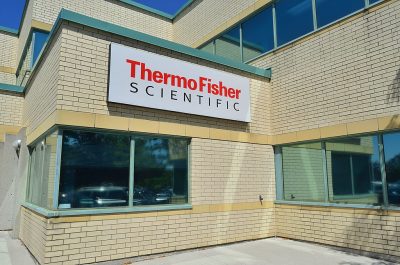Massachusetts-based company Thermo Fisher Scientific has begun producing ultra-cold freezers to store coronavirus vaccines as they near the final stages of development and approval in the United States.

A U.S. Food and Drug Administration advisory panel is expected to vote Thursday on whether to grant an emergency-use authorization to a vaccine developed by Pfizer and BioNTech. If approved, that vaccine will need to be stored at temperatures around negative 70 degrees Celsius, or negative 94 degrees Fahrenheit.
Thermo Fisher freezers can store samples at temperatures as low as negative 86 degrees Celsius, according to its website.
Although pharmacies can store other vaccines, such as the flu shot, within the temperature range of a home freezer, Pfizer’s coronavirus vaccine depends on colder temperatures and rapid freezing, according to Alex Esmon, general manager for cold storage products at Thermo Fisher.
“One other consideration is managing consistent temperature throughout the distribution of the vaccines,” Esmon wrote in an email. “It will be critical to have monitoring of the temperature stability of the vaccines as they go through the movement from hub locations to clinics and hospitals.”
Nicholas Rhind, professor of molecular pharmacology at the University of Massachusetts Medical School, said the company has produced extra-cold freezers in the past.
“Thermo Fisher builds a lot of minus-80 freezers. In fact, my lab owns one of them,” Rhind said. “Thermo Fisher is one of the largest suppliers of laboratory equipment, so it doesn’t surprise me at all that they would be involved in that sort of infrastructure project.”
Rhind uses Thermo Fisher freezers to preserve samples from his own research on DNA replication and cell size regulation, he said.
“You can store live cells at minus 80 and they will stay viable for certainly many years,” Rhind said. “If you kept the same samples at minus 20, they wouldn’t survive.”
Mansoor Amiji, professor of pharmaceutical sciences at Northeastern University, said increased or unstable temperatures during transportation could compromise the integrity of the vaccine.
“It needs a cold chain to protect it from degrading,” Amiji said. “Those storage temperatures are necessary to protect the mRNA molecule. Otherwise, that mRNA molecule is going to basically be nonfunctional and ultimately will not serve its intended purpose.”
Storage logistics aside, college students may need to wait longer than others to receive the vaccine.
Professor Kenneth Kaitin of Tufts University School of Medicine said vaccinating younger adults and teenagers will likely be the lowest-priority cohort to receive the vaccine.
“We’re talking about a lot of people that are probably going to be vaccinated before we get to healthy college students,” Kaitin said. “I’m excited about the approval of the vaccine, but if I were in college, I wouldn’t put much hope in the idea that I’m going to be in the first group of folks that are going to be vaccinated.”
Despite potential delays in vaccination among certain populations, Rhind said the manufacturing of ultra-cold freezers is a good sign.
“It’s clearly an important part of the supply chain infrastructure,” Rhind said, “and so it is encouraging that it is being done.”
























































































































